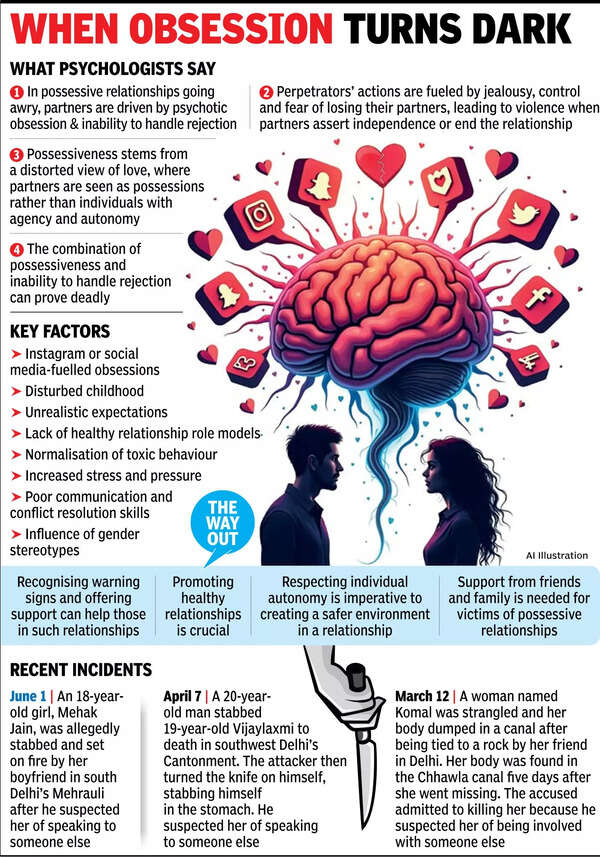Jealousy kills the deal: How toxic love is turning fatal in times of social media | Delhi News

NEW DELHI: The recent murders of 21-year-old Komal, 19-year-old Vijaylaxmi and 18-year-old Mehek Jain are grim reminders of the twisted ways of possessive partners. These young women, full of life and promise, were killed by individuals who claimed to love them.While Komal was strangled and her body dumped in the Chhawla canal on March 12, Vijaylaxmi was stabbed to death by her 20-year-old boyfriend in the Delhi Cantonment on April 7 and Jain was stabbed and set on fire in south Delhi’s Mehrauli on Sunday. The three murderers were men who allegedly were in a relationship with the women and suspected the latter of talking to or being involved romantically with other men.

In each of these cases, the perpetrator’s actions were fuelled by a toxic mix of psychotic obsession, jealousy, control and a deep-seated fear of losing their partners, as evident from police questioning. The cops also noted that social media platform Instagram was a common factor, with posts on it fuelling anger and snowballing into full-fledged ‘revenge’.The accused apparently used social media platforms to ‘monitor’ and ‘control’ their girlfriends and became irate when they saw the girls interacting with other friends or acquaintances online. The instant gratification and constant connectivity offered by these platforms, cops said fuelled such obsessive tendencies.Psychologists say that extreme possessiveness can stem from deep-seated insecurities and a lack of trust, which are exacerbated by the curated and often superficial nature of social media. According to mental health experts, the rise of possessiveness and violence in young couples can be attributed to a complex interplay of factors, including social media-fuelled obsessions, unrealistic expectations and normalisation of toxic behaviours.“Apart from the underlying gender dynamics and socioeconomic inequalities at play, what we are witnessing in these cases points to a deeper psychological issue,” explained Dr Nimesh Desai, senior consultant psychiatrist and former director, IHBAS. “We often talk about paranoia, but many of these individuals suffer from a more specific condition known as delusional disorder, particularly the subtype involving delusions of infidelity or jealousy.“Desai continued, “These individuals may appear to be functioning normally in other aspects of life, but there is often a specific area of the mind, which we refer to as ‘focused pathology’, that is entirely consumed by irrational suspicion and possessiveness. They strongly believe their partner is being unfaithful, despite no evidence in some cases, and this distorted thinking dominates their emotional responses and decisions.“He added that in recent years, mental health professionals had increasingly encountered persons involved in violent incidents who exhibited signs of this psychiatric pattern. He also pointed out that young people these days were navigating relationships with a high sense of frustration and low tolerance levels. “They struggle with rejection and are often driven by a deep sense of personal insecurity, which can manifest as obsessive attachment, jealousy and, in extreme cases, violence,” said Desai.Highlighting the need for greater awareness, psychologists said it was crucial for friends, family and community members to recognise the warning signs of possessive behaviour and to offer support to those who may be trapped in such relationships.According to Dr Jitendra Nagpal, senior psychiatrist and life skills expert, “There is a serious need for individuals in troubled relationships to find safe spaces to express what they are going through. Unfortunately, many feel extremely isolated even among close friends or family.”He added, “There is often a deep sense of embarrassment and a strong stigma attached to admitting that something might be wrong in their relationship. Thoughts like ‘How can I be imperfect in my relationship?’ prevent them from opening up. As a result, even incidents of emotional abuse, toxic patterns, or recurring fights are never shared. They bottle everything up and suffer silently, becoming virtually alone despite being surrounded by people.“Dr Nagpal said there were warning signs in relationships, emotional triggers, red flags and patterns that predicted a ripple effect. “But unless someone vents or speaks up about them, things only worsen over time. Impatience and emotional impulsivity in relationships can often be understood as one of the root causes of such violent behaviour,” he noted.






